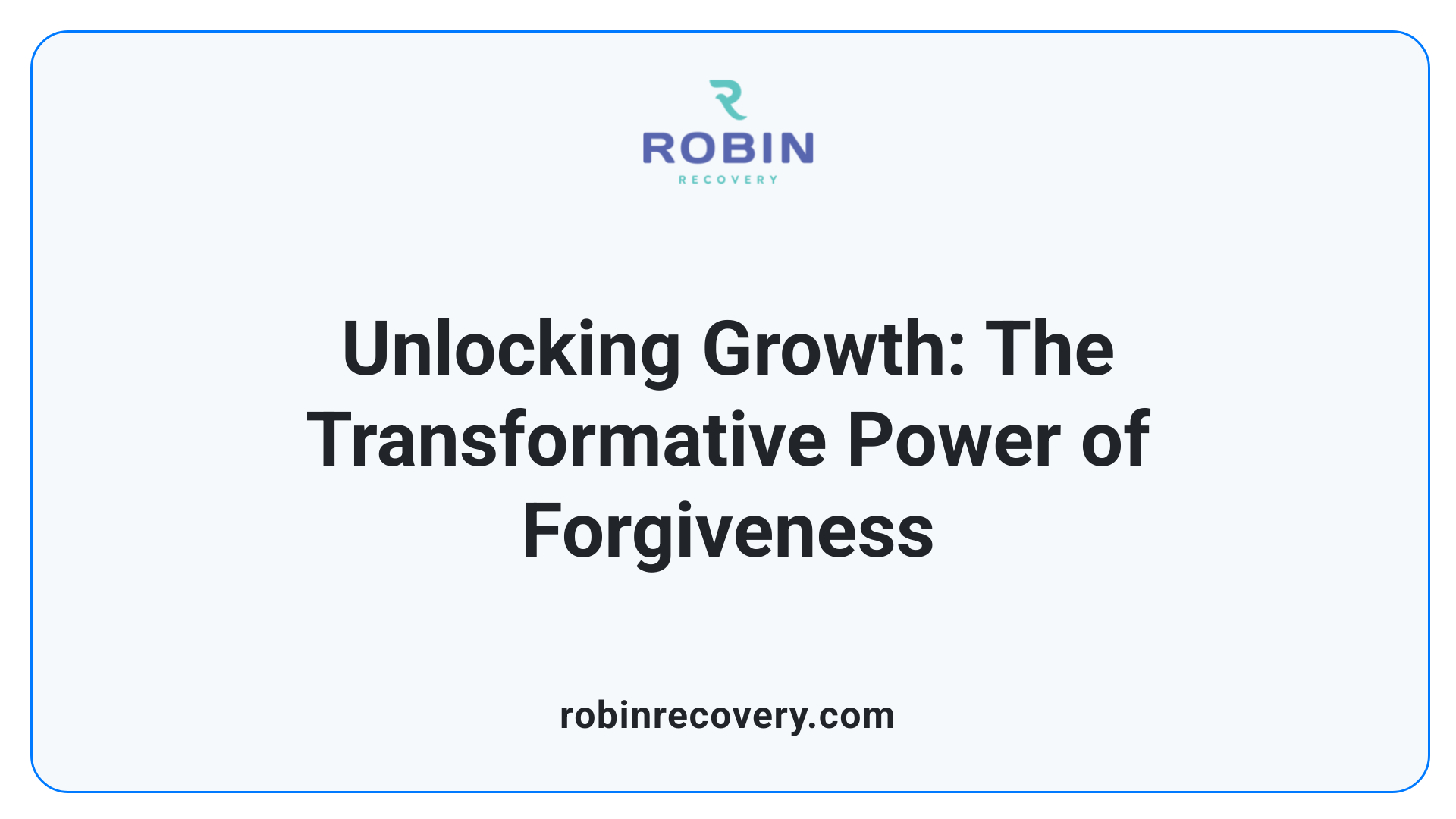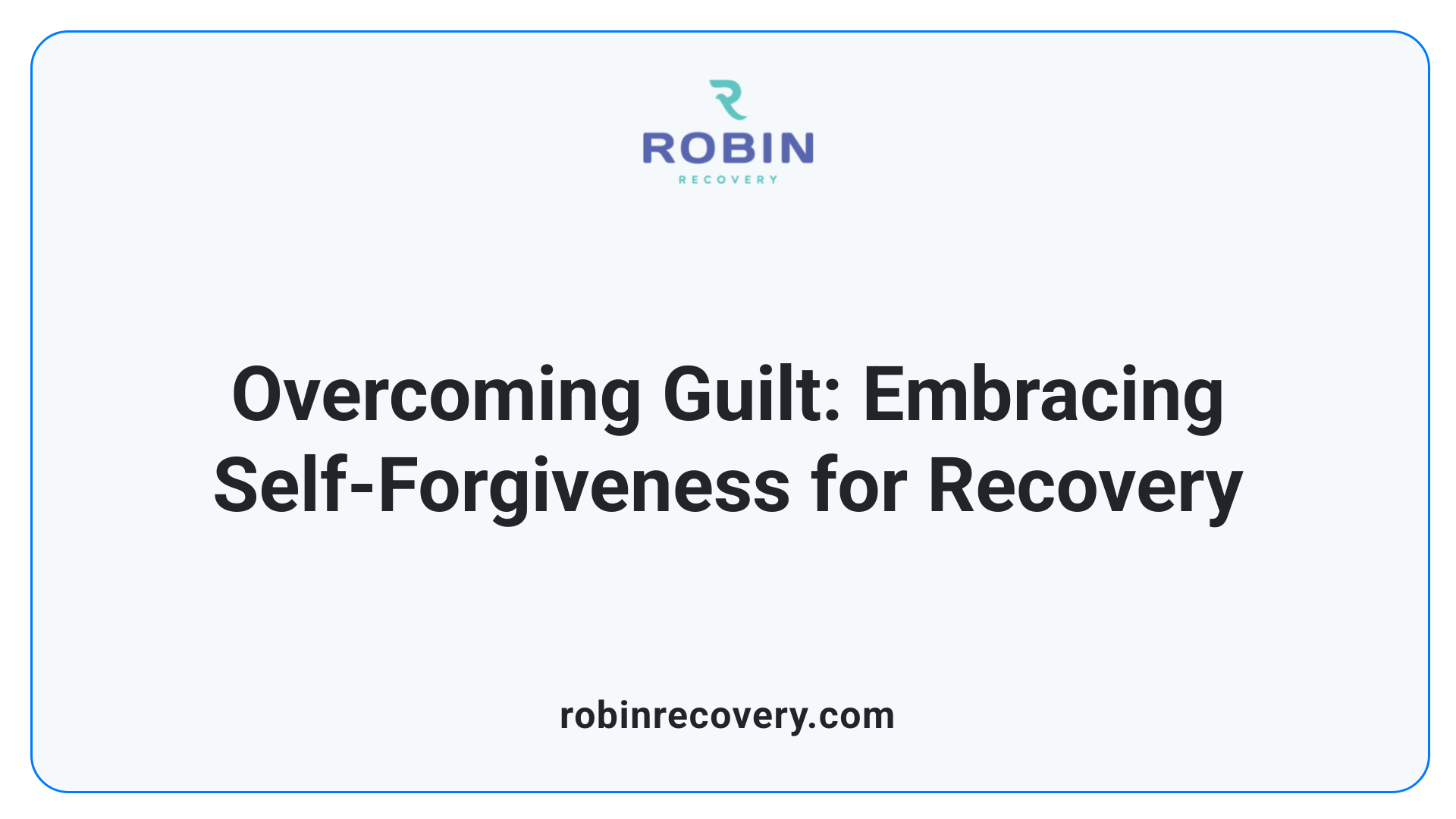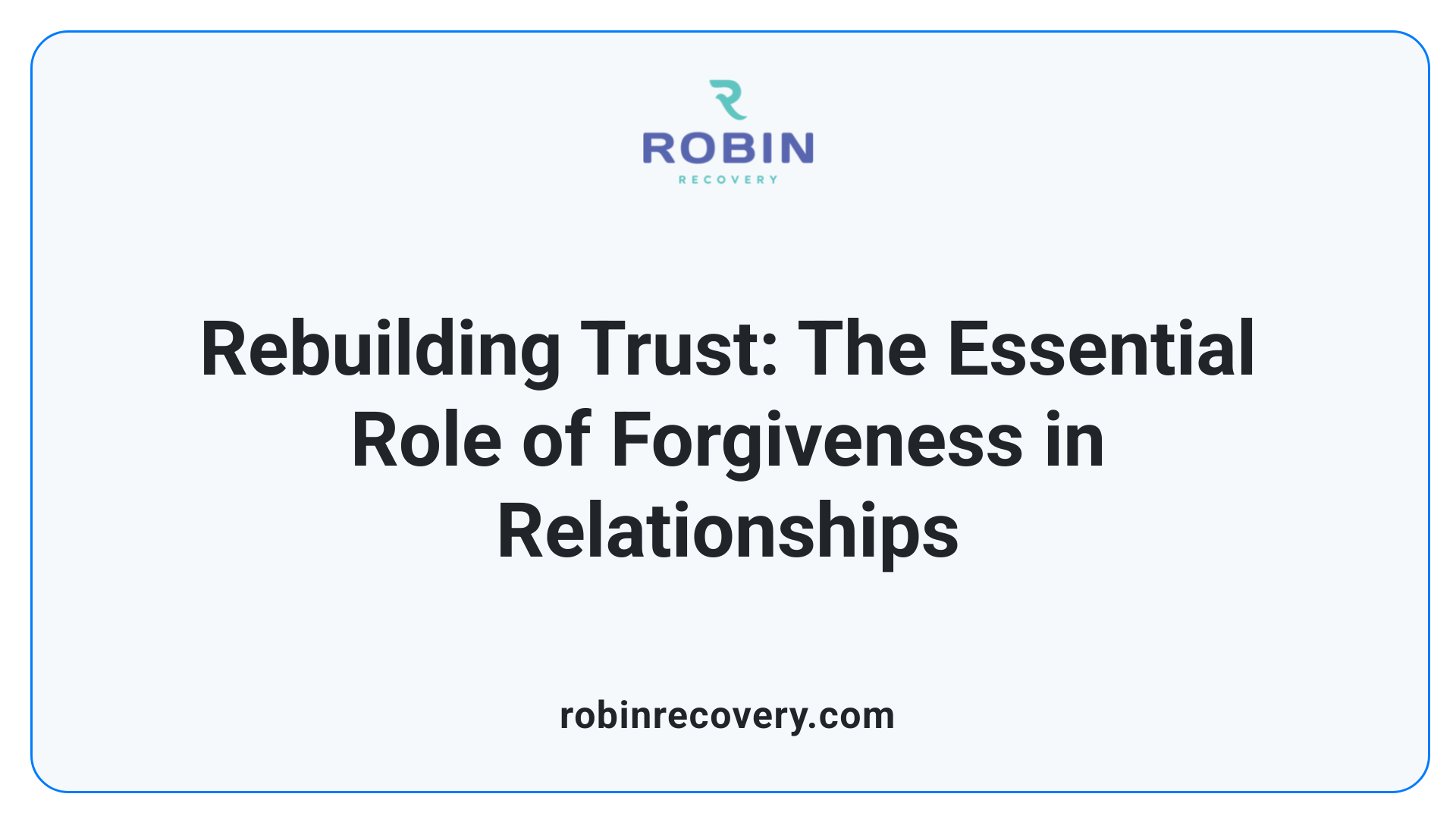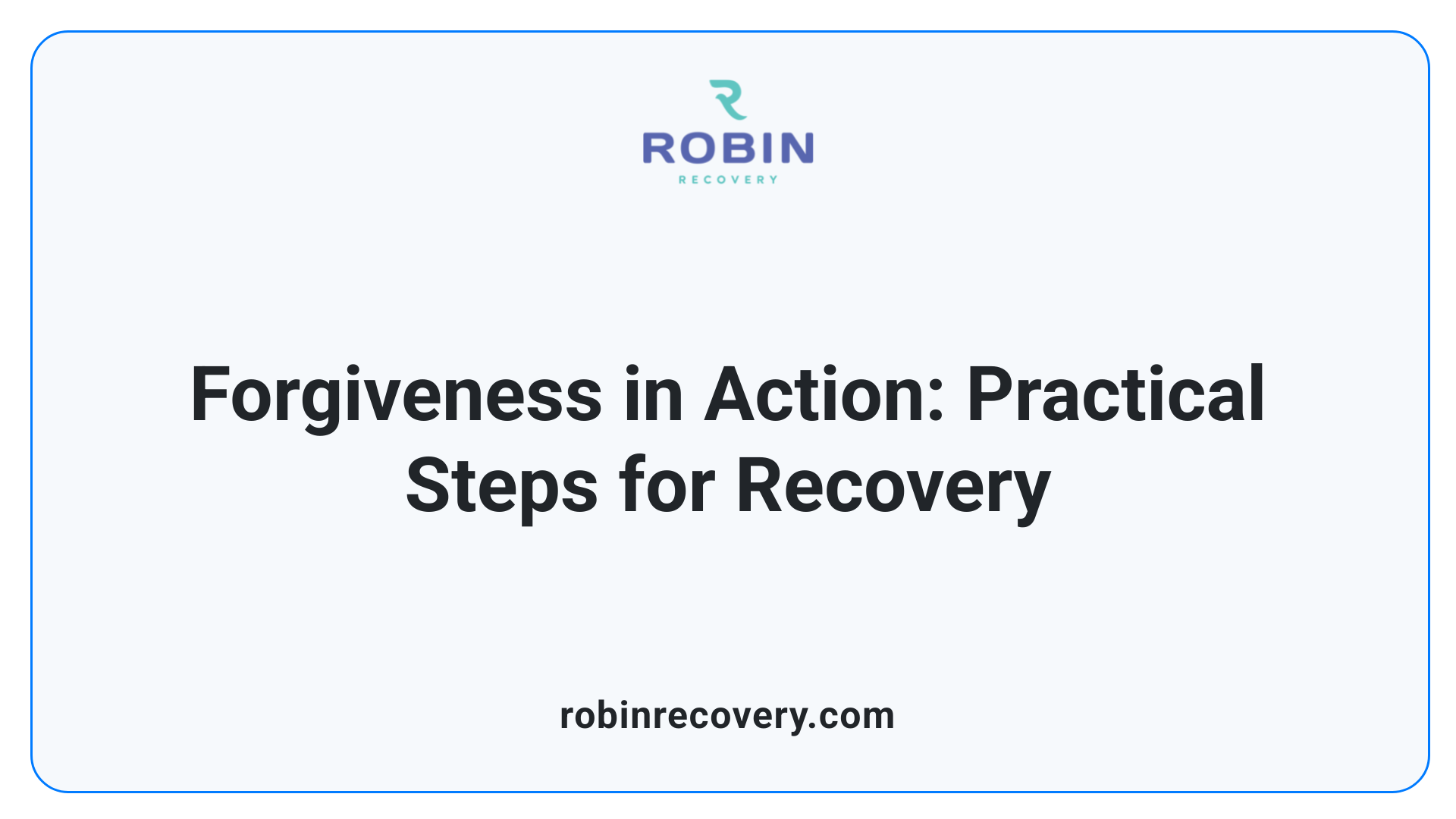The connection between forgiveness and personal growth in recovery

Understanding Forgiveness in the Recovery Process
Forgiveness is often considered a powerful and transformative emotion, particularly within the context of addiction recovery. It not only facilitates personal growth and healing but also aids in rebuilding fractured relationships and fostering resilience. Throughout the recovery journey, individuals encounter various emotional and psychological challenges, where forgiveness—both of oneself and others—plays a vital role in overcoming these hurdles. This narrative explores the connection between forgiveness and personal growth, emphasizing its importance in attaining long-term sobriety and emotional well-being.
The Impact of Forgiveness on Personal Growth

How does forgiveness impact personal growth during addiction recovery?
Forgiveness plays a critical role in personal growth during addiction recovery. By allowing individuals to let go of resentment and bitterness, forgiveness facilitates emotional healing. This emotional release is essential for reducing stress and improving overall well-being, as it leads to increased self-awareness and self-compassion.
Through the practice of forgiveness, individuals can break the cycle of guilt and shame often associated with addiction. Self-forgiveness enables them to acknowledge their past mistakes without being paralyzed by guilt, fostering a healthier self-image that encourages personal growth. Additionally, forgiving others helps to mend broken relationships, which enhances communication and empathy. This support network is crucial in the recovery journey.
Engaging in forgiveness not only promotes mental stability but also cultivates resilience. Improved emotional health allows individuals to better handle challenges, aiding them in maintaining their recovery. Furthermore, the process strengthens relationships, instilling trust and a sense of community, both of which are foundational for a successful recovery journey.
Ultimately, practicing forgiveness creates a pathway for healing and growth, leading to deeper emotional connections and sustained personal development.
Navigating Self-Forgiveness to Overcome Guilt

What role does self-forgiveness play in overcoming guilt and shame in recovery?
Self-forgiveness holds a pivotal role in overcoming guilt and shame during the recovery journey. By facilitating emotional healing, it encourages individuals to embrace self-compassion instead of succumbing to self-loathing. This process aids in understanding the differences between guilt and shame. While guilt can serve as a constructive reflection of one's actions, shame often leads to a debilitating cycle of negativity.
In practicing self-forgiveness, individuals learn to acknowledge their imperfections. This involves taking responsibility for past behaviors without becoming trapped in guilt or shame. Techniques such as writing forgiveness letters and employing affirmations can dramatically shift one’s self-perception, enabling growth and healing. This empowerment fosters personal acceptance and ultimately paves the path toward lasting peace and positive change.
Healing Relationships through Forgiveness

Releasing Resentment and Building Trust
Forgiveness plays a crucial role in healing relationships, especially for those in recovery from addiction. Letting go of resentment is not merely about clearing the air; it acts as a catalyst for transformational change. When individuals choose to forgive, they dismantle the emotional barriers erected by past hurts, allowing for a more authentic connection with others. This process fosters trust, encourages openness, and cultivates empathy, essential elements for rebuilding damaged relationships that may have been affected by addiction.
Psychological Benefits of Forgiveness in Healing Relationships During Recovery
The psychological benefits of forgiveness in healing relationships during recovery are profound and multifaceted. Practicing forgiveness facilitates the release of resentment and guilt, which are significant barriers to emotional health, thereby promoting a sense of personal peace. Lowering stress and anxiety not only boosts mental well-being but also reduces the risk of relapse. Moreover, it helps individuals confront past grievances, fostering empathy and intimacy in relationships, which are essential for recovery.
Self-forgiveness ties into this process; individuals who forgive themselves strengthen their self-esteem and resilience, making healthier connections with others possible. Thus, forgiveness contributes to better mental health, and it even has positive physical health implications, creating a holistic approach to healing in recovery.
AspectForgiveness ImpactRecovery Benefit Emotional Health Lowers stress, anxiety, and depression Promotes personal peace Relationship Dynamics Fosters empathy, trust, and intimacy Enhances connection with loved ones Self-Worth Increases self-esteem and resilience Facilitates healthier relationships
Practical Strategies for Cultivating Forgiveness

What are practical strategies for implementing forgiveness in addiction recovery?
There are several practical strategies individuals can adopt to integrate forgiveness into their recovery process. Engaging in reflective journaling can be particularly effective. This practice involves writing about personal experiences, feelings of resentment, and the impact of past mistakes. It not only promotes self-reflection but also helps in identifying underlying emotions related to forgiveness.
Therapy sessions focused on forgiveness are another crucial strategy. Professional guidance can facilitate deeper emotional healing, allowing individuals to explore feelings of guilt and shame. Utilizing forgiveness exercises or worksheets can further help in processing past grievances, making the journey towards forgiveness more structured and less daunting.
What are some self-forgiveness practices?
Self-forgiveness practices involve recognizing past mistakes while embracing self-compassion. This shift in perspective can significantly reduce feelings of guilt that may lead to relapse. Acknowledging that addiction is a disease, and not a moral failure, is essential in this process.
Additionally, letting go of resentment involves practicing empathy — both towards oneself and others. Seeking support through resources like SAMHSA’s National Helpline can connect individuals with treatment facilities and support groups, which are vital for maintaining a supportive network during recovery. Family therapy can also foster forgiveness among family members, aiding in the emotional healing necessary for restoration of trust and relationships.
Forgiveness as a Catalyst for Resilience and Spiritual Growth

How can forgiveness promote resilience and spiritual growth during recovery?
Forgiveness is a powerful factor in enhancing both resilience and spiritual growth during recovery. By letting go of guilt and shame, individuals create emotional space necessary for healing. This process allows them to break free from the chains of resentment that often accompany past actions, fostering a renewed sense of self-worth.
- Emotional Freedom: Letting go of past resentments promotes healthier relationships. When individuals forgive, they reduce the stress that burdens their emotional state, enabling more positive interactions with others.
- Self-Acceptance: Self-forgiveness plays a crucial role as it encourages acknowledging mistakes without self-condemnation. This acceptance is fundamental for personal development and facilitates growth.
- Improved Mental Health: The practice of forgiveness can alleviate anxiety, depression, and stress—common struggles in recovery. A positive mindset nurtures resilience, supporting the ongoing journey towards sobriety.
As one integrates forgiveness into their recovery, they not only align themselves with values that foster compassion but also enrich their spiritual growth. Incorporating these practices is essential for achieving lasting healing and a deeper connection to one’s purpose in life. Understanding and embracing forgiveness can pave the way for transformative personal growth that enhances resilience and supports lasting recovery.
The Dual Significance of Self-forgiveness and Forgiveness of Others
Why are both self-forgiveness and forgiveness of others significant in healing from addiction?
Both self-forgiveness and forgiveness of others play a crucial role in healing from addiction, serving as catalysts for emotional release and personal growth.
- Self-forgiveness enables individuals to:
- Let go of guilt and shame attached to past behaviors related to addiction.
- Focus on the present and actively pursue positive changes in their lives.
- Break the cycle of self-hatred, which can perpetuate substance use.
- Cultivate self-compassion, a vital aspect of overcoming recovery challenges.
- Forgiveness of others helps individuals:
- Alleviate anger and resentment, which can impede emotional health and recovery progress.
- Restore relationships strained by addiction, fostering better social support systems.
- Enhance mental well-being, creating a more stable foundation for sustained recovery.
The cycle of mutual reinforcement in forgiveness
Research indicates a cycle of mutual reinforcement between forgiveness of self and forgiveness of others.
- As individuals learn to forgive themselves, they are often more capable of extending forgiveness to others.
- Likewise, forgiving others can lead to increased self-forgiveness, creating a positive feedback loop that supports recovery.
This interplay suggests that both forms of forgiveness are not just beneficial but essential for achieving long-term recovery, emotional healing, and personal growth.
Forgiveness as a Pathway to Healing and Growth
The journey of addiction recovery is fraught with emotional challenges, where forgiveness serves as a crucial tool for healing and personal growth. By embracing forgiveness, individuals can let go of the self-defeating emotions of guilt, shame, and resentment, thus paving the way for emotional resilience and spiritual expansion. Practicing forgiveness not only supports healing within oneself but also mends broken relationships and fosters a robust support network essential for sustained recovery. As individuals engage in this transformative practice, they unlock the door to a more compassionate, peaceful, and meaningful life, reiterating the profound connection between forgiveness and personal growth in recovery.
References
- Longitudinal Relationship between Forgiveness of Self and ...
- The Impact of Self-Forgiveness and Forgiving Others in Recovery
- The Power of Forgiveness: Becoming Stronger in Recovery
- Understanding the Benefits of Forgiveness in Addiction Recovery
- Is Self Forgiveness The Key to Lasting Recovery?
- The Role of Forgiveness in Recovery - Tara Treatment Center
- Gratitude and Forgiveness: The Cornerstones of the Recovery Process
- Practicing Self-Forgiveness as Part of the Recovery Process
